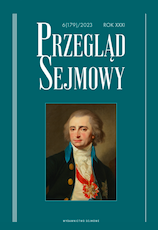Kontekst polityczny Konstytucji z Kadyksu z 1812 r.
Political Context of the Constitution of Cádiz of 1812
Author(s): González CristinaSubject(s): Politics / Political Sciences, Law, Constitution, Jurisprudence
Published by: Kancelaria Sejmu
Summary/Abstract: The article presents the political context of the enactment of the Constitution of Cádiz. The crisis of power in Spain, caused by the French invasion of this kingdom, lasted from 1808 to 1814. Both the majority of Spanish elites and, above all, the wide circles of society did not accept Joseph Napoleon I Bonaparte, continuing to recognise Ferdinand VII Bourbon as the legitimate king. The Spanish War of Independence created ideal conditions to act for the liberals, whose aim was to adopt a modern constitution. This paper outlines the process by which parties with divergent political views, such as absolutists, reformers and liberals, led to the enactment of the Spanish Carta Magna. After the end of the war and the return of Ferdinand VII Bourbon from France to Spain, the king refused to sign the constitution and once again governed as an absolute monarch. The Constitution of Cádiz was no longer in force and the fragility of its foundations became apparent.
Journal: Przegląd Sejmowy
- Issue Year: 179/2024
- Issue No: 6
- Page Range: 227-245
- Page Count: 19
- Language: English, Polish

